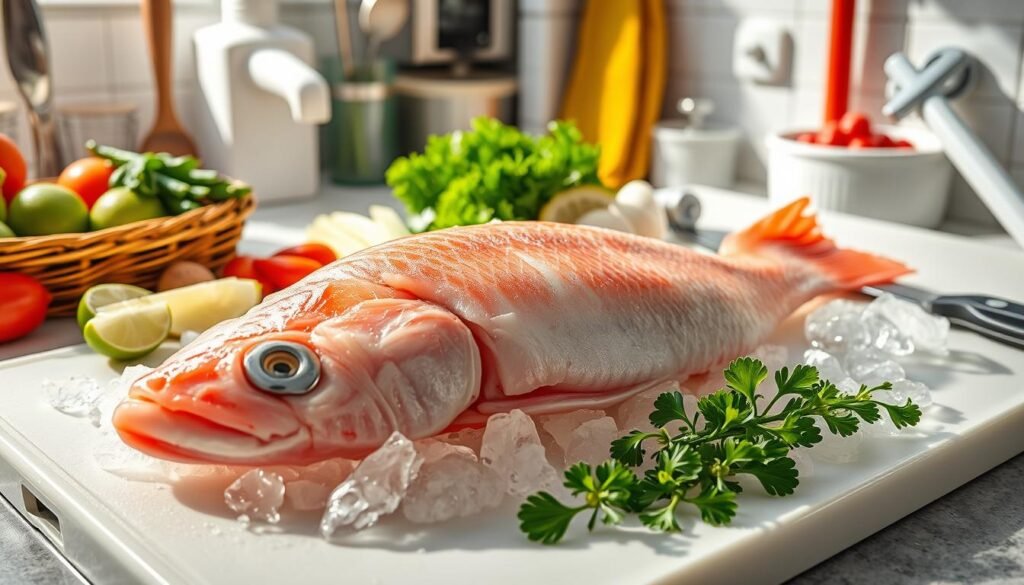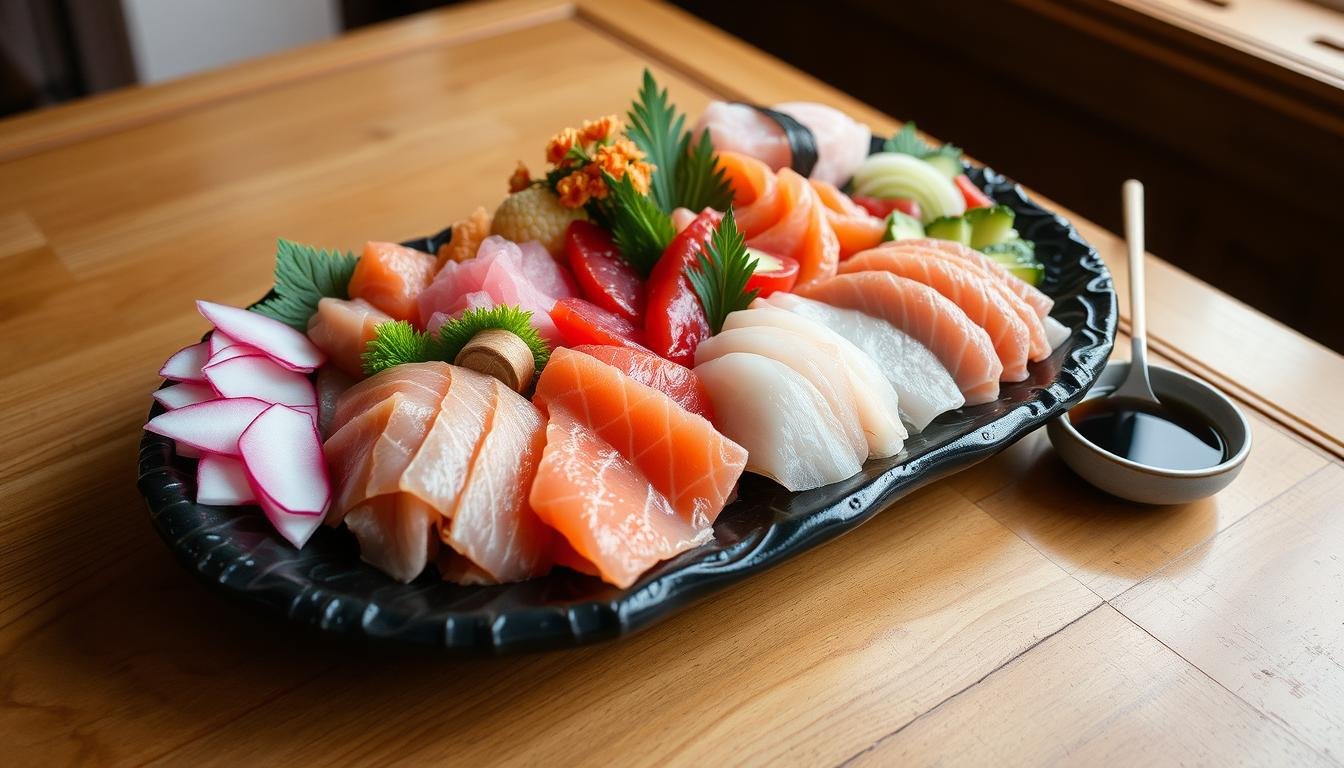Discover the Art of Raw Fish Cuisine
The first time I tasted raw fish, it was magical. The sushi’s delicate texture melted in my mouth, revealing deep flavors. It changed how I saw Japanese cuisine. Raw fish is more than food; it’s a journey through culinary history.
Raw fish dishes have been loved for centuries, from Japan’s waters to kitchens worldwide. Whether you’re new to food or a seasoned lover, raw fish offers a unique taste adventure.
Raw fish cuisine is an art form that values freshness, skill, and tradition. Sushi and sashimi show chefs’ amazing talent in turning simple ingredients into unforgettable dishes.
Table of Contents
Understanding Raw Fish and Its Cultural Significance
Raw fish has become a favorite among food lovers around the world. It turns seafood into a form of art that goes beyond borders. From old ways of keeping fish fresh to today’s fancy dishes, raw fish shows the rich flavors of global food traditions.
The History of Raw Fish Dishes
The story of raw fish in cooking goes back thousands of years. Sushi started over 1,000 years ago in Southeast Asia. It really took off in Japan’s Edo period (1603-1868). Street vendors in Edo created nigiri sushi, which is loved all over the world today.
“Sushi is not just food, but a reflection of cultural artistry and culinary precision.” – Traditional Japanese Chef
Raw Fish in Different Cultures
Raw fish dishes are very different in different cultures:
- Japan: Sashimi and nigiri show off careful preparation
- Peru: Ceviche is a lively seafood tradition
- Italy: Carpaccio gives a light raw fish taste
Health Benefits of Eating Raw Fish
Eating raw fish is good for you in many ways. For example, Norwegian salmon is full of Omega-3 fatty acids. These are great for your brain and heart. Seafood also has high-quality protein and is low in calories.
| Nutrient | Benefit |
|---|---|
| Omega-3 Fatty Acids | Supports cardiovascular health |
| Protein | Promotes muscle development |
| Minerals | Enhances overall nutrition |
When you try raw fish dishes, keep in mind. About 90% of seafood in the United States is imported. Choose fresh, sustainable fish for the best taste and health benefits.
Popular Types of Raw Fish Dishes
Raw fish cuisine is a world of flavors and traditions. It includes delicate sashimi and tangy ceviche. These dishes show how seafood can be prepared in many ways across cultures.
Sushi and Sashimi: Japanese Culinary Art
Sushi and sashimi are top in Japanese raw fish dishes. A 2020 survey by Kyotaru found salmon and bluefin tuna are favorites. The main difference is:
- Sushi: Raw fish with vinegared rice
- Sashimi: Raw fish without rice
- Nigiri: Hand-pressed sushi with raw fish on rice
Ceviche: A Peruvian Seafood Delight
Ceviche adds a zesty twist to raw fish. This Peruvian dish cooks seafood with citrus juices. The lime or lemon juice changes the fish’s texture, making it tangy and refreshing.
“Ceviche represents the perfect marriage of freshness and technique in raw fish preparation.” – Peruvian Chef
Carpaccio: Italian Raw Fish Innovation
Carpaccio is an Italian dish that turns raw fish into something elegant. Thinly sliced fish is dressed with olive oil, herbs, and citrus. This creates a delicate dish that highlights the fish’s natural taste.
Whether you love sushi or just want to try new foods, these dishes will open your eyes to global flavors.
Selecting Fresh Raw Fish
Choosing the right fresh fish is key for tasty seafood dishes. Whether you’re making raw fish at home or picking the best cut for sashimi, knowing how to spot top-quality seafood can make your cooking better.
Tips for Choosing the Best Fish
Here are some expert tips for finding the perfect fresh fish:
- Look for bright, shiny flesh with clear, bulging eyes
- Check for firm, moist fillets without tears or ragged edges
- Smell is critical – fresh fish should have a clean, ocean-like scent
- Seek fish markets with high turnover rates
Sustainability and Ethical Sourcing
It’s important to eat seafood responsibly. Here are some tips for choosing ethical raw fish:
- Use apps like Seafood Watch to identify sustainable species
- Support vendors certified by Marine Stewardship Council
- Ask about the fish’s origin and catching methods
“The quality of raw fish begins with understanding its journey from ocean to plate.” – Seafood Expert
Seasonal Variations in Fish
Raw fish quality changes with the seasons. Different species are at their best at different times, affecting taste and texture. Tuna, salmon, and yellowtail are usually good but still vary by season.
Pro tip: Always check how the fish is stored. Fish stored properly stays fresh for up to two days. Restaurants often keep fish on ice to keep it fresh.
Essential Techniques for Preparing Raw Fish
Mastering raw fish recipes needs precision and skill. It’s all about understanding Japanese cuisine. Professional dishes require careful preparation and special techniques to turn fresh seafood into art.
When you prepare raw fish, safety and technique are key. The FDA says to freeze fish at -4°F (-20°C) for 7 days. This kills parasites, making your meal safe.
Filleting and Skinning Techniques
Starting with the right tools is crucial. The traditional Japanese Yanagiba knife is vital for precise cuts. Important techniques include:
- Cleaning fish in cold water
- Cutting against the grain for tenderness
- Using sharp, specialized knives
- Maintaining consistent slice thickness
Marinating and Curing Methods
Marinating raw fish boosts flavor and texture. Techniques include:
- Citrus-based marinades
- Salt curing
- Vinegar treatments
Expert chefs say to eat raw fish within 24 hours for best quality and safety.
Presentation Tips for Raw Fish Dishes
| Cutting Technique | Description | Best Used For |
|---|---|---|
| Hira-Zukuri | Rectangular, flat slices | Sashimi |
| Kaku-Zukuri | Square or cube-shaped pieces | Modern plating |
| Usu-Zukuri | Paper-thin slices | Delicate presentations |
To make stunning raw fish dishes, focus on details. Think about garnishes, plate color, and how to arrange it. This will make your dish stand out.
Pairing Raw Fish with Flavors
Exploring raw fish cuisine is all about flavor pairing. Japanese cuisine shows us how to enhance seafood’s taste without overpowering it.
Choosing the right sides can change your meal. The aim is to add to the fish’s taste, not hide it.
Complementary Ingredients to Consider
- Citrus fruits like yuzu and lime
- Fresh herbs such as shiso and cilantro
- Specialty salts from different regions
- Light marinades with minimal acid content
Seasonings that Enhance Raw Fish Flavors
Japanese cuisine teaches us how to season raw fish well. Wasabi and soy sauce are favorites, but use them wisely.
“A true sushi master understands that seasoning should whisper, not shout.” – Traditional Japanese Culinary Wisdom
| Condiment | Recommended Usage | Flavor Impact |
|---|---|---|
| Wasabi | Light touch | Sharp, cleansing |
| Soy Sauce | Minimal dipping | Umami enhancement |
| Ponzu | Sparingly | Citrus notes |
Learning about these pairings can make your seafood better. Try different mixes to find your favorite raw fish taste.
Remember: The key is balance. Each ingredient should support the raw fish, not overshadow its natural beauty.
Safety Tips for Handling Raw Fish
Enjoying raw fish needs careful attention to safety and quality. Seafood can be tasty, but knowing how to handle it is key to avoid health risks.

When working with fresh or raw fish, there are important safety steps to take. These steps help prevent foodborne illnesses:
- Check visual and sensory indicators of freshness
- Understand proper storage temperatures
- Minimize contamination risks
Identifying Freshness in Seafood
Fresh fish should show certain signs of quality and safety. Look for:
- Clear, bright eyes
- Firm, elastic flesh
- Clean, ocean-like smell
- Minimal discoloration
Storage and Temperature Control
Keeping raw seafood at the right temperature is crucial. The FDA says to store it below 40°F to stop bacteria from growing. Freezing can also kill parasites.
“Trust in your source and prioritize food safety when enjoying raw fish dishes.”
Risk Mitigation Strategies
Some groups face more risks from raw fish. People with weak immune systems, pregnant women, kids, and seniors should be extra careful. Here are some ways to protect yourself:
- Purchase seafood from reputable sources
- Use proper refrigeration
- Practice excellent hand hygiene
- Freeze fish at -4°F for one week to eliminate parasites
By following these tips, you can enjoy raw fish safely. This way, you can enjoy its taste while keeping health risks low.
Creating Your Own Raw Fish Dish at Home
Exploring raw fish recipes is an exciting adventure in your kitchen. Whether you love sushi or want to try new fish dishes, making raw fish at home needs skill and care.
Before starting your raw fish journey, knowing the key techniques and tools is important. Let’s look at what you need to make tasty sushi and ceviche at home.
A Simple Sushi Recipe to Try
Making sushi is an art that mixes fresh ingredients with careful steps. Here’s a simple recipe to begin with:
- Use 8 ounces of sashimi-grade fish (snapper, fluke, or tuna)
- Soak fish fillets in icy water and vinegar for 10 minutes
- Prepare seasoning with 7 key ingredients
Ceviche: Making It Right
Ceviche is a raw fish dish that mixes fresh flavors with simple steps. For a real taste, remember these important points:
- Select high-quality, fresh fish
- Use 4-5 large lettuce leaves
- Add 1 cup of seedless cucumber
- Include ⅓ cup of julienned carrots
Tools You’ll Need for Preparation
| Tool | Purpose |
|---|---|
| Sharp Knife | Precise fish slicing (7-10mm thickness recommended) |
| Cutting Board | Clean surface for fish preparation |
| Serving Platter | Elegant presentation of raw fish dishes |
*Crafting raw fish dishes demands patience and practice. Don’t be discouraged if your first attempts aren’t perfect!*
Creating sushi and other raw fish recipes is about enjoying the journey and improving your cooking skills. Start simple, use fresh ingredients, and most importantly, have fun trying these tasty fish dishes!
Raw Fish and Wine Pairings
Exploring seafood and wine pairings is a world of flavors. Whether you’re into Japanese cuisine or trying international fish dishes, the right wine can make your raw fish taste even better.

Choosing wine for raw fish is an art. Seafood’s delicate taste needs careful wine selection. Lighter, crisper wines are usually best for raw fish.
Choosing the Right Wine for Raw Fish
Your wine should match the subtle flavors of raw fish. Here are some tips for great pairings:
- Choose dry white wines with high acidity
- Look for light-bodied wines with mineral notes
- Stay away from heavy, oak-aged wines that can overwhelm fish flavors
Popular Pairing Suggestions
Different raw fish dishes need specific wines:
- Sushi and Sashimi: Sauvignon Blanc, Muscadet, Albariño
- Fatty Fish (Salmon, Tuna): Light Pinot Noir or Rosé
- Delicate White Fish: Chablis or unoaked Chardonnay
“The right wine transforms a simple seafood meal into a memorable culinary experience.”
A good wine for raw fish is refreshing, low in alcohol, and has crisp acidity. Quality sushi wine costs about $8. This shows you don’t need to spend a lot for great pairings.
Exploring Global Raw Fish Recipes
Start a food journey that takes you around the world. Discover the variety of raw fish dishes from Tokyo to Peru. These recipes will open your eyes to new seafood flavors.
Raw fish dishes are more than food. They connect people from all over through their love of food. Each place has its own way of making raw fish, creating dishes that are both delicious and unique.
Regional Culinary Treasures
Every culture has its own special way of making raw fish dishes. Here are some amazing examples:
- Korean Hoe: Delicate raw fish served with vegetable accompaniments
- Hawaiian Poke: Cubed fish marinated in traditional Hawaiian seasonings
- Italian Crudo: Minimalist raw fish preparation highlighting fresh ingredients
- Peruvian Ceviche: Citrus-marinated seafood with bold flavors
Expert Techniques from Master Chefs
Professional chefs share their secrets for making raw seafood. They turn simple ingredients into amazing dishes.
“The secret to exceptional raw fish is absolute freshness and precise technique.” – Chef Marco Rodriguez
| Region | Raw Fish Dish | Key Preparation Method |
|---|---|---|
| Japan | Sashimi | Precise knife skills, minimal seasoning |
| Peru | Ceviche | Citrus marinade, quick preparation |
| Italy | Crudo | High-quality olive oil, sea salt |
Exploring global raw fish recipes lets you see the amazing variety of seafood dishes. Whether you love cooking at home or exploring new foods, these dishes will spark your next culinary adventure.
The Future of Raw Fish Cuisine
The world of raw fish dishes is changing fast. Japanese cuisine is leading the way in new ways to prepare and enjoy raw fish.
New trends are changing how we view raw fish. Technology and caring for the planet are key in this shift. The sushi market is huge, worth over $10 billion a year in 2023.
Innovative Trends in Raw Fish Preparation
- Plant-based seafood alternatives emerging as a sustainable option
- Advanced preservation techniques extending freshness
- Global fusion approaches to traditional fish dishes
New tech is making big changes in raw fish cooking. Companies like Azuma Foods are leading the way. They offer a wide range of products for different diets.
Market Innovations and Consumer Preferences
| Innovation Category | Key Developments |
|---|---|
| Plant-Based Alternatives | Future Fish lineup with vegan tuna, salmon, and squid substitutes |
| Market Growth | Japanese vegan food market projected to grow 11.2% CAGR (2023-2028) |
| Sustainable Options | Increased focus on environmentally friendly seafood alternatives |
People want raw fish dishes that are both new and true to tradition. The future of Japanese food looks promising. It will feature more plant-based and eco-friendly choices.
“The culinary world is constantly evolving, and raw fish cuisine is at the forefront of this exciting transformation.”
When you dive into raw fish, you’ll find more creative dishes. You’ll also see a focus on sustainable sources and new alternatives. These changes honor both old ways and new tastes.
Conclusion: Embracing the Raw Fish Experience
Your journey into raw fish cuisine is more than just food. It’s a way to explore different cultures, health benefits, and cooking art. Raw fish dishes let you taste flavors that connect you to ancient traditions worldwide.
Starting with raw fish means being open-minded and learning about safety and preparation. With more than 65% of city folks eating sushi or sashimi every month, you’re part of a growing group. It’s important to choose good seafood, learn how to prepare it, and respect the traditions behind these dishes.
Encouraging Culinary Adventure
Keep exploring raw fish cuisine with curiosity and respect. Whether you try traditional narezushi in Tokyo or make ceviche at home, each bite links you to global food heritage. Raw fish is not only tasty but also good for you, packed with omega-3s, protein, and vitamins.
Final Thoughts on Enjoying Raw Fish
Your adventure with raw fish is just starting. By learning techniques, following safety rules, and trying new flavors, you’ll make seafood into a special meal. Enjoy the art, appreciate the details, and let your taste guide you through the world of raw fish.
FAQ
Is it safe to eat raw fish at home?
What is the difference between sushi and sashimi?
How do I know if fish is fresh enough for raw consumption?
What are the health benefits of eating raw fish?
Can I prepare raw fish dishes if I’m not a professional chef?
What are the most common risks associated with eating raw fish?
What wines pair well with raw fish dishes?
Are there vegetarian alternatives to raw fish dishes?
Source Links
- Japanese Sashimi (Raw Fish) | DelishGlobe – https://delishglobe.com/recipe/japanese-sashimi-raw-fish/
- ONE FISH RAW BAR – https://www.onefishcampbell.com/blog/how-to-eat-sashimi-the-proper-way
- ONE FISH RAW BAR – https://www.onefishcampbell.com/blog/sushi-vs-sashimi-key-differences-explained
- Raw Fish – Select Fish – https://select.fish/foodservice/raw-fish/
- Cultural Significance of Sushi in Japan and Beyond – Yuzu Omakase ゆずお任せ – https://www.yuzuomakase.com/blog/the-world/cultural-significance-of-sushi/
- Types of Sushi Fish & Seafood: A Beginner’s Guide – https://www.byfood.com/blog/culture/types-of-sushi-fish-beginners-guide
- 11 Different Types of Sushi: Find Your New Favorite – https://www.byfood.com/blog/culture/different-types-of-sushi
- How to Choose Fish Fillets – https://thecookful.com/how-to-choose-fish-fillets/
- The Ultimate Guide to Ordering Sashimi: How to Navigate the Menu Like a Pro – Island Gardens – https://islandgardens.com/the-ultimate-guide-to-ordering-sashimi-how-to-navigate-the-menu-like-a-pro
- Raw Fish Tips: Everything you need to know about handling raw fish at home — Seaside with Emily – https://www.seasidewithemily.com/blog/raw-fish-tips-everything-you-need-to-know-about-handling-raw-fish-at-home
- Eating raw fish – how to do it safely — Hungry Soles – https://www.thehungrysoles.com/blog/eating-raw-fish-how-to-do-it-safely
- How To Cut And Prepare Sashimi And Sushi – https://seidoknives.com/blogs/news/how-to-cut-sashimi?srsltid=AfmBOooaFoSQf-O16f4bxdua3JEmjFFYS14TEpbOqcq8Ce4Rv91ydT9K
- Perfect Sushi and Drink Pairings: Enhance Your Experience – https://www.kurukurusushihawaii.com/blog/a-culinary-harmony-types-of-sushi-and-their-perfect-drink-pairings/
- Wasabi, Ginger, Soy Sauce & More – https://www.kurukurusushihawaii.com/blog/the-perfect-condiment-pairings-for-sushi-wasabi-ginger-and-more/
- Your Guide to Safely Devouring Raw Fish: Risks, Benefits, and More – Happy Sashimi – https://www.eathappysashimi.com/safe-eat-raw-fish/
- Food Safety Guidelines for the Preparation of Sushi – YOSHIMASA – https://www.yoshimasausa.com/2024/03/27/food-safety-guidelines-for-the-preparation-of-sushi/
- About Four Steps to Food Safety – https://www.cdc.gov/food-safety/prevention/index.html
- Spicy raw fish (Hoe-muchim: 회무침) – https://www.maangchi.com/recipe/hoe-muchim
- Sashimi (Sliced Raw Fish) – https://japan.recipetineats.com/sashimi-sliced-raw-fish/
- What wine should you drink with fish? – https://fionabeckett.substack.com/p/what-wine-should-you-drink-with-fish
- Wine Pairing: Sushi & the Asian Palate – The Wine Diplomats – https://winediplomats.com/sushi/
- How To Pair Wine With Sushi And Sashimi Tasting Menus – https://www.forbes.com/sites/paulcaputo/2024/08/30/how-to-pair-wine-with-sushi-and-sashimi-tasting-menus/
- International Fish Board – Kosher.com – https://www.kosher.com/recipe/international-fish-board/
- Recipes – https://globalseafoods.com/blogs/recipes?srsltid=AfmBOop4cyavr5l5jKsusDPVb9mL8v0LDaiu7zmyDKTZP0WOhSiehD8E
- Reimagining Sushi Safety: A Collaborative Approach to Food Standards – https://www.food-safety.com/articles/9657-reimagining-sushi-safety-a-collaborative-approach-to-food-standards
- Azuma Foods Launches Plant-Based Seafood Range “Future Fish” in Japan – vegconomist – the vegan business magazine – https://vegconomist.com/food-and-beverage/meat-and-fish-alternatives/azuma-foods-launches-plant-based-seafood-future-fish-japan/
- Embracing Narezushi: Tracing the Taste of Ancient Sushi in Japan from Fermented Fish to Modern… – https://zendine.medium.com/embracing-narezushi-tracing-the-taste-of-ancient-sushi-in-japan-from-fermented-fish-to-modern-1bc14b237609
- What are the Benefits of Eating Raw Foods: Embracing Tradition and Nutrition – Mommyow.com – https://mommyow.com/what-are-the-benefits-of-eating-raw-foods-embracing-tradition-and-nutrition/

